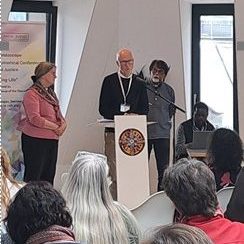International and Ecumenical Conference On Racial Justice.
Freiburg im Breisgau, Germany, November 8-11, 2023.
This conference had high ambitions and a packed programme. Just two of its many stated purposes were ‘To address the reality of racial injustice-visible and hidden-that is still to be found in the life of the church, among faith communities, and in society’ and ‘To encourage genuine communities of belonging, where each finds him-herself welcomed by all, and all realise the importance of accepting each person as they are’.
The conference heard research evidence of racism and its effects in a presentation by Dr Sonia Diaz-Monsalve, (Co-ordinator MSc Global Urban Health, Centre for Medicine and Society-University of Freiburg), who demonstrated the negative impact of racism, including that directed against Sinti and Roma people across Europe, on health, well-being and life chances. I was struck by the similarity of the findings to those of other studies in the UK looking at outcomes for Gypsies, Roma and Travellers.
A particular highlight for most delegates was the bible study offered each morning by Prof. Dr Sathianathan Clarke, renowned theologian on global Christianity. I particularly appreciated his exposition of Matthew 15: 21-28, ‘The cheeky outcast: Canaanite Women’, who represented all people who are the despised ‘other’. Yet this woman was able to share her great ‘pagan faith’ and impress Jesus to the extent that he changed his thinking and his practice. We were reminded that the church, of whichever denomination, does not have the exclusive expression of God’s presence, wisdom, and grace in our world. We were asked to consider what ‘great faith’ (verse 28) might be and encouraged to understand it not as right doctrine; or having insight alone but something that is also active (it shows itself through what we do) and is life giving.
Revd. Martin Burrell – Bishop’s Advisor for Gypsies, Travellers and Roma, Diocese of Canterbury – said:
“I was also deeply challenged by Prof. Clarke when he broke open the significance of John the Baptist bursting onto the first page of Mark’s Gospel. We are used to thinking of Jesus as the key player, but Mark chooses to begin his narrative by choosing someone from right outside the regular Jewish camp to kick start the action. This crazy guy from the desert has such immediate appeal to the masses that they come to repent and be baptised in their droves. Jesus too cues up to enter the waters. His public ministry begins through the work of a complete outsider, who shatters all our pious expectations of how God would normally work. Prof. Clarke got me asking, “who might be today’s equivalent of John the Baptist? Where is this ‘voice crying in the wilderness’ coming from in our day?”

